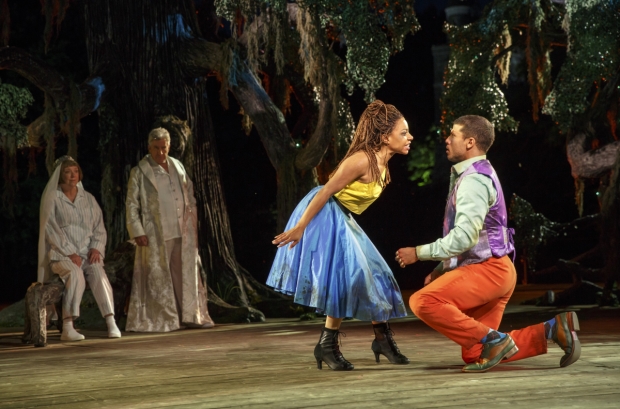5 Questions With A Midsummer Night's Dream's Shalita Grant
The ”Vanya and Sonia and Masha and Spike” Tony nominee (and ”NCIS: New Orleans” star) returns to the New York stage for the first time since 2013.
In 2013, Shalita Grant made a big splash in the New York theater scene as Cassandra, a soothsaying housekeeper in Christopher Durang's Tony-winning comedy Vanya and Sonia and Masha and Spike. After the Broadway production closed, Grant packed up and moved to Los Angeles, where, after reprising her performance in the production's L.A. mounting, she auditioned for a lot of projects. And in her words, she could not get hired.
Then, all of a sudden, she was cast in two TV dramas: NCIS: New Orleans for CBS and the Civil War serial drama Mercy Street for PBS. While she was "kicking bad-guy ass" in New Orleans, she got the call to make her return to New York theater as Hermia in Lear deBessonet's free Shakespeare in the Park production of A Midsummer Night's Dream at the Delacorte Theater. It's the chance for Grant to return to her stage roots, and she's relishing the opportunity.

(© Elena Gharbigi)
1. What have you been up to since Vanya and Sonia and Masha and Spike closed?
I moved right to L.A., and I had a year of active unemployment. I had 50-something auditions for 50-something different projects, testing and doing callbacks, and could not get hired. And then, almost a year to the day of being out in L.A., I booked my first job, and then I started booking something every other month. Then I booked two series, NCIS: New Orleans and Mercy Street, at the same time.
2. Did it take you much time to adjust to the demands of television after having done theater for much of your career?
I think for me it was really adjusting to the culture of TV, which is very different than the culture of theater. I had to really learn what it meant to be on a set and what the expectations were, and what producers are. I had to learn who I'm talking to and what their functions are. I had a couple of gaffes, I would ask a person a question and it wasn't their job. I had to Google their job description. That was the first big adjustment.
3. How did you get cast in A Midsummer Night's Dream?
I was in the throes of kicking bad-guy ass in New Orleans and I got a call for my agent who told me he got me Midsummer, ''so come back to New York and do Shakespeare." And I was like, "Absolutely, I would love to." And it's with director Lear deBessonet, who I did a workshop with several years ago. She told me she's had her eye on me all these years to work together, and now we're doing it.
4. What kind of skill set does it take to do Shakespeare, and specifically a comedy like Midsummer?
You have to use your arsenal to make it clear and entertaining. You have to work to make the language clear. My first day, I read the script with everyone and I didn’t really have a planned performance. This is the first time I've played an ingenue in my career. I didn’t really know what the expectation was of me, but I played it pretty straight that first day. I went up to Lear and said, "This feels horrible. I feel like a boring person. I hope that's not what you want." And she said absolutely not. I got to really bring as much humor and strength and just variety to the role. I'm really grateful to Lear for that.
5. What is the most fun part of doing free Shakespeare in the Park?
I think this play is perfect for the Delacorte. You've got the castle in the background, and the lake, so when we go into the forest, you can give yourself over to it. We are all in the forest together. That's so magical to be in the open air. There's so much text about weather in the play, and we get rain. It makes the language even more present. The people who are seeing it feel they're in this; they're experiencing it right now. What a gift.

(© Joan Marcus)










